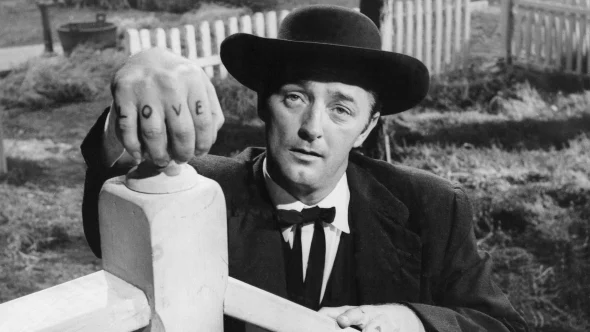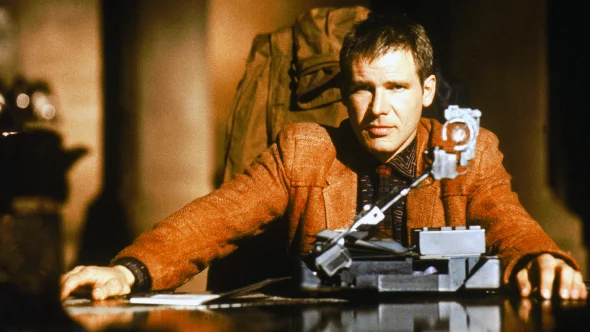
"I knew that if I was going to try to make my own films, I would need to be an auteur," Jane Schoenbrun says. The trans and nonbinary writer-director worked in the film industry for years before they committed to becoming a filmmaker themself ("which I really only could do once I had started to heal from the shame and repression of pre-transition"). During that time, they saw firsthand how difficult it was to navigate a risk-averse system with a personal vision.
"I knew I would need to have a lot of freedom to say something truthful," reasons Schoenbrun. So, they worked outside the commercial industry and made their first film, 2021's creepypasta-inspired We're All Going to the World's Fair, with "basically no money." "Exactly because I knew that if I tried to make it for even a little bit of money, I don't think I would've been allowed to make it in the way that I did."
We're All Going to the World's Fair broke out at the 2021 Sundance Film Festival; meanwhile, Schoenbrun was coming out. Their sophomore feature, I Saw the TV Glow, which they wrote upon their own "egg crack," is a kind of trans allegory that captures the experience of dysphoria through suburban ennui and '90s TV. Off the success of We're All Going to the World's Fair, Schoenbrun had the chance to make I Saw the TV Glow with A24 and Emma Stone's Fruit Tree production banner "for not no money, and I could be just as bold, if not more bold."
"Getting that opportunity and then from within that opportunity, getting the chance to make something that was this personal, this visceral, this much speaking from inside trans experience that hasn't really been done, at least on this level, so often — every part of the process was completely surreal," says the filmmaker. "I felt like I was pulling off some kind of existential bank heist."
Below, Schoenbrun shares with A.frame five of their favorite films, which shaped their cinematic sensibilities as much as they shaped them as a person. "I have been told that I can nerd out with the best of them," they say as they dive in. "I'll go chronologically."

Directed by: Charles Laughton | Written by: James Agee
I saw The Night of the Hunter during a deep dive that I did through the film canon, that also, coincidentally, coincided with the worst of my dysphoria. I basically hid inside for three years and watched every movie ever made. I think my own journey through the canon was one of looking for outliers or transmissions from, I guess in this case, quite literally the bottom of the lake that were exposing something underneath the classical, Western male film canon. Much of what I found there, from Chantal Akerman to [Yasujirô] Ozu, was just people who were speaking in a different vernacular.
As a first and only feature, The Night of the Hunter is so striking. It's [Robert] Mitchum's performance a the darkness that it conjures and the haunted image of American terror and the terror of an American childhood, I had never seen anything like it. There are images in that movie that feel almost biblical in how deeply they understand the heritage of this gothic underbelly of American childhood. It's just beautiful, and I re-watch it constantly, which to me is the mark of a great film. The '50s were this moment where the nuclear family was being codified so deeply, and I feel like Nicholas Ray was the only other American auteur at that time who was probing so deeply. But this film just captures something truly horrifying, grotesque, and beautiful at the same time.

Directed by: Ridley Scott | Written by: Hampton Fancher and David Webb Peoples
I watched Blade Runner probably 10 times while I was writing and prepping I Saw the TV Glow. I found myself returning to films that felt so insanely beautiful; I want to say aesthetically, but I think it's more than that here. The fusion of aesthetics and mood, and this poetic depression — this neon melancholy that hangs over every moment in Blade Runner — and the love and energy that went into building that universe, taking this noir cityscape and making it glow and turning it neon. It feels emo to me in a way that I adore and try to craft in my own work, and it's just infinitely rewatchable. The longer you go not having seen Blade Runner, the more that aesthetic and that feeling and that universe calls to you as almost a favorite song that you want to hear again, or at least for me.

Written and Directed by: Abbas Kiarostami
Close-Up was another early one for me in my deep immersion into the film canon. The Iranian filmmaker Abbas Kiarostami very quickly became someone who I felt was expressing a relationship to the medium of film and the ways in which it can allow you to talk about the human experience in ways that I found endlessly fascinating. There are two types of films that I like when I'm watch movies: One is "I never could have made that, but I'm in awe of it," and then there's the "I wish I had made that." When I watch Kiarostami's films, I'm watching an absolute master make the kind of work that I hope my own work can achieve a fraction of emotional impact.
Close-Up, in particular, is this so simple but infinitely complex interrogation, not only of film as a medium and how it informs our relationship to real life and vice versa, but the ways in which the documentary form is inherently existing in this paradox between real life and "fiction." But the film also has such a deep empathy from within all of that and is using the medium and manipulating the medium and manipulating our expectations of the medium to give somebody who seems like they really need a hug, a hug.

Directed by: David Lynch | Written by: David Lynch and Robert Engels
I would venture to call Twin Peaks: Fire Walk with Me my favorite film, and the irony of a film that's spun off from television there is not lost on me. In fact, I think it isn't lost on Lynch, either. After the opening credits of this film, we see a sledgehammer smash through a TV screen. This is the first actual image of the film.
Lynch, like he always does, is hyper aware of the context and the memory that the audience is going to bring to the film. You enter Twin Peaks: Fire Walk with Me with the expectations of the TV show and everything that was unresolved and culturally significant about the TV show, and then Lynch absolutely decimates all of it to make something that's completely bold in its structure and unrelenting in its portrayal of the deepest form of physical and emotional abuse. It's this devastating, horrific portrait of a girl crumbling and collapsing underneath that. It very much engaged with suburbia and with conceptions of the nuclear family, and the horror inherent underneath it, and it goes to places that made me feel things I'd never felt before.
I think the film, in many ways, is quite ecstatic. There are sequences in the movie where it's just so unhinged and firing on every cylinder that a film can fire on, in terms of its visuals and soundscapes, and then Sheryl Lee's performance, I find it to be this work of deep, deep empathy, and an empathy that you could really only get to by traversing down into the absolute depths of darkness.

Written and Directed by: Richard Kelly
Southland Tales is maybe my favorite film of the 21st century. I think it's still ahead of its time and certainly was ahead of its time when it came out. It exists in this sub-genre of auteur-driven films that I am obsessed with, which is the go-for-broke movie. He had made Donnie Darko, and it was this unexpected video store hit. He probably had a lot of people in Hollywood thinking he was smart — which he is — and wanting to capture the heat of Donnie Darko, so he was able to get an insane amount of freedom and scope and resources to make the wildest and most expensive experimental examination of the misinformation of the Bush era and all that would follow in just the wildest and craziest way.
It's a hilarious movie. It's just pure audacity from the very beginning, stylistically, in terms of who he's putting on the screen, in some of those shots that he pulls off. The plot, the world building, the cars having sex, it's just completely unprecedented. On one level, watch it is pure joy for me, because what a heist. But beyond that, it also captures this moment of media saturation and entertainment saturation that was taking on new-found political implications in the wake of 9/11 and the Bush era. It's like what my film explores in the 1990s, this period of stability in the suburbs where you could just sit and stare at a screen and be a "perfect American family" is starting to show its rot and its sinister nature, and Richard Kelly goes to town on it. The scene in the middle of the movie where Justin Timberlake, playing an Iraq war vet, lip syncs in an arcade with blood on his shirt to The Killers? I know that it's maybe not for everybody, but for me when I watch that, I'm just like, "What else would you be making films for, if not to pull off something like that?"






